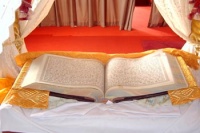Template:AOW375: Difference between revisions
Hari singh (talk | contribs) (Created page with '{{aowh|Worldwide praise for the Guru Granth Sahib}} {{p2|File:SGGS9.jpg|'''Guru Granth Sahib'''}} The manuscript of the Sikh Gurus' hymns contained in [[Gu…') |
Hari singh (talk | contribs) No edit summary |
||
| Line 2: | Line 2: | ||
{{p2|File:SGGS9.jpg|'''[[Guru Granth Sahib]]'''}} | {{p2|File:SGGS9.jpg|'''[[Guru Granth Sahib]]'''}} | ||
The manuscript of the [[Sikh Guru|Sikh Gurus']] hymns contained in [[Guru Granth Sahib]] were handed down by [[Guru Nanak]] to [[Guru Angad]]: by [[Guru Angad]] to [[Guru Amardas]] and by [[Guru Amardas]] to [[Guru Ramdas]]. [[Guru Amardas]] compiled the first Granth (book) of the hymns. [[Guru Arjan Dev]] compiled the first edition of the Granth, called the [[Adi Granth]]. He started the preparation of the Granth in August, 1601, and completed it 3 years later in August, 1604. | The manuscript of the [[Sikh Guru|Sikh Gurus']] hymns contained in the [[Guru Granth Sahib]] were handed down by [[Guru Nanak]] to [[Guru Angad]]: by [[Guru Angad]] to [[Guru Amardas]] and by [[Guru Amardas]] to [[Guru Ramdas]]. | ||
[[Guru Amardas]] compiled the first Granth (book) of the hymns. [[Guru Arjan Dev]] compiled the first edition of the Granth, called the [[Adi Granth]]. He started the preparation of the Granth in August, 1601, and completed it 3 years later in [[August]], [[1604]]. | |||
The scribe of the Granth was [[Bhai Gurdas]], an uncle of [[Guru Arjan]]. The place of compilation of the Granth is [[Ramsar]] ([[Amritsar]]). [[Guru Gobind Singh]] compiled the second edition of the Granth in 1706 at [[Damdama Sahib]] near [[Bhatinda]], [[Punjab]]. The scribe was [[Bhai Mani Singh]], a classmate of [[Guru Gobind Singh]]. | The scribe of the Granth was [[Bhai Gurdas]], an uncle of [[Guru Arjan]]. The place of compilation of the Granth is [[Ramsar]] ([[Amritsar]]). [[Guru Gobind Singh]] compiled the second edition of the Granth in 1706 at [[Damdama Sahib]] near [[Bhatinda]], [[Punjab]]. The scribe was [[Bhai Mani Singh]], a classmate of [[Guru Gobind Singh]]. | ||
[[Guru Gobind Singh]] bestowed upon the Granth the Guruship at [[Nanded]] in 1708. Munshi Sant Singh, author of the Sikh history, composed the most popular verse in 1865 which a Sikh recites daily after his prayer. ''"All community should recognize Guru Granth as the Guru. All obey the commandments contained therein. Recognize the Granth as the visible body of the Guru. The Sikh who wishes to meet me should find me there."'' | [[Guru Gobind Singh]] bestowed upon the Granth the Guruship at [[Nanded]] in [[1708]]. Munshi Sant Singh, author of the Sikh history, composed the most popular verse in 1865 which a Sikh recites daily after his prayer. ''"All community should recognize Guru Granth as the Guru. All obey the commandments contained therein. Recognize the Granth as the visible body of the Guru. The Sikh who wishes to meet me should find me there."'' | ||
Praise for the Guru has been part of Sikh history since the time of the first Guru. The Gurus did not praise themselves. They called themselves as humble servants of God and worked in the service of mankind. <!---It were only the successive Gurus who praised and appreciated the works of the predecessor Gurus. It were the [[Bhatt]]s (singers) in the time of [[Guru Arjan Dev]] who praised the Gurus. While writing about the Guru's greatness, one "Bhatt" (singer) by name "Mathura" wrote in the praise of Guru Arjan Dev: ''"Whoever meditates on Guru Arjun Dev, shall not have to pass through the painful womb of reincarnation ever again. ||6||"'' (Sri Guru Granth Sahib -page 1409).---> {{aowf|Worldwide praise for the Guru Granth Sahib}} | Praise for the Guru has been part of Sikh history since the time of the first Guru. The Gurus did not praise themselves. They called themselves as humble servants of God and worked in the service of mankind. <!---It were only the successive Gurus who praised and appreciated the works of the predecessor Gurus. It were the [[Bhatt]]s (singers) in the time of [[Guru Arjan Dev]] who praised the Gurus. While writing about the Guru's greatness, one "Bhatt" (singer) by name "Mathura" wrote in the praise of Guru Arjan Dev: ''"Whoever meditates on Guru Arjun Dev, shall not have to pass through the painful womb of reincarnation ever again. ||6||"'' (Sri Guru Granth Sahib -page 1409).---> {{aowf|Worldwide praise for the Guru Granth Sahib}} | ||
Revision as of 10:15, 25 December 2011
The manuscript of the Sikh Gurus' hymns contained in the Guru Granth Sahib were handed down by Guru Nanak to Guru Angad: by Guru Angad to Guru Amardas and by Guru Amardas to Guru Ramdas.
Guru Amardas compiled the first Granth (book) of the hymns. Guru Arjan Dev compiled the first edition of the Granth, called the Adi Granth. He started the preparation of the Granth in August, 1601, and completed it 3 years later in August, 1604.
The scribe of the Granth was Bhai Gurdas, an uncle of Guru Arjan. The place of compilation of the Granth is Ramsar (Amritsar). Guru Gobind Singh compiled the second edition of the Granth in 1706 at Damdama Sahib near Bhatinda, Punjab. The scribe was Bhai Mani Singh, a classmate of Guru Gobind Singh.
Guru Gobind Singh bestowed upon the Granth the Guruship at Nanded in 1708. Munshi Sant Singh, author of the Sikh history, composed the most popular verse in 1865 which a Sikh recites daily after his prayer. "All community should recognize Guru Granth as the Guru. All obey the commandments contained therein. Recognize the Granth as the visible body of the Guru. The Sikh who wishes to meet me should find me there."
Praise for the Guru has been part of Sikh history since the time of the first Guru. The Gurus did not praise themselves. They called themselves as humble servants of God and worked in the service of mankind. .....More

